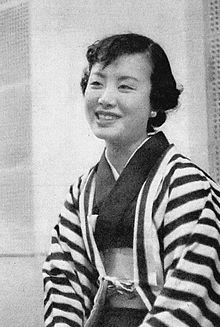
Back هيبارى ميسورا ARZ Hibari Misora Azerbaijani هیباری میسورا AZB Hibari Misora Catalan Hibari Misora German Misora Hibari Esperanto Hibari Misora Spanish هیباری میسورا Persian Hibari Misora Finnish Hibari Misora French
Hibari Misora | |
|---|---|
 Hibari Misora in 1954 | |
| Born | Katō Kazue (加藤 和枝) May 29, 1937 Yokohama, Kanagawa, Japan |
| Died | June 24, 1989 (aged 52) Minato, Tokyo, Japan |
| Nationality | Japanese |
| Other names | Queen of Showa, Queen of the popular song, Queen of Enka |
| Occupation(s) | Singer, Actress |
| Honours | Peoples Honor Award on July 2, 1989 after her death |
| Musical career | |
| Genres | |
| Years active | 1945–1989 |
| Website | misorahibari |
Hibari Misora (美空 ひばり, Misora Hibari, born Kazue Katō (加藤 和枝, Katō Kazue) May 29, 1937 – June 24, 1989) was a Japanese singer, actress and cultural icon.[1][2] She received a Medal of Honor for her contributions to music and for improving the welfare of the public, and was the first woman to receive the People's Honour Award, which was conferred posthumously for giving the public hope and encouragement after World War II.[3][4]
Misora recorded a total of 1,200 songs and sold 68 million records.[5] After she died, consumer demand for her recordings grew significantly, and, by 2001, she had sold more than 80 million records.[6] By 2019, record sales surpassed 100 million.[7][8] Her swan-song "Kawa no Nagare no Yō ni" (川の流れのように) is often performed by numerous artists and orchestras as a tribute to her, including notable renditions by The Three Tenors (Spanish/Italian), Teresa Teng (Taiwanese) and Mariachi Vargas de Tecalitlan (Mexican).[9][10][11]
Each year there is a special on Japanese television and radio featuring her songs. A memorial concert for Misora was held at the Tokyo Dome on November 11, 2012. It featured numerous musicians such as Ai, Koda Kumi, Ken Hirai, Kiyoshi Hikawa, Exile, AKB48 and Nobuyasu Okabayashi amongst others, paying tribute by singing her most famous songs.[3]
- ^ "NHKは何を伝えてきたか−NHKテレビ番組の50年". Nhk.or.jp. Archived from the original on April 7, 2015. Retrieved January 27, 2013.
- ^ "Top 100 Japanese pops Artists – No.5|HMV ONLINE". Hmv.co.jp. November 26, 2003. Retrieved January 27, 2013.
- ^ a b "| a-ticket(エーチケット)". Avexlive.jp. Archived from the original on March 4, 2016. Retrieved January 27, 2013.
- ^ "国民栄誉賞受賞者リスト". Hyou.net. Retrieved January 27, 2013.
- ^ "Hibari Misora, Japanese Singer, 52". The New York Times. June 25, 1989. Retrieved September 29, 2021.
- ^ "Nippon Columbia Co., Ltd. | History". Columbia.jp. Retrieved January 27, 2013.
- ^ "美空ひばり生涯売上1億枚「うれしい限り」長男社長 - 音楽 : 日刊スポーツ". nikkansports.com (in Japanese). Retrieved November 30, 2020.
- ^ "美空ひばりさん、生涯売上枚数が1億枚を突破 ファンからも惜しみない拍手". ORICON NEWS. Retrieved November 30, 2020.
- ^ Matthew Hernon (February 7, 2022). "Spotlight: Hibari Misora — The Queen of Enka". Tokyo Weekender. Archived from the original on November 24, 2023.
...Eight years after her death, it was voted the greatest Japanese song of all time in a national poll by NHK. In 1996, The Three Tenors delighted fans when they performed the track at their concert in Tokyo. The song has been covered by several other well-known artists, including "Asia's eternal queen of pop" Teresa Teng.
- ^ "スーパーセレクション - テレサ・テン". Oricon. Retrieved November 23, 2023.
12. 川の流れのように - 最高順位 - 13位 - 登場回数 - 15週 - 発売日 - 1995年06月07日
- ^ "May 9 – 29: Music and Movies - Santa Clara County Library District". Santa Clara County Library District. May 9, 2022. Archived from the original on April 2, 2023.
...Mariachi Vargas de Tecalitlan performed Kawa no nagare no yō ni in Japan in the song's original language. They also recorded a version of it in Spanish and Japanese...